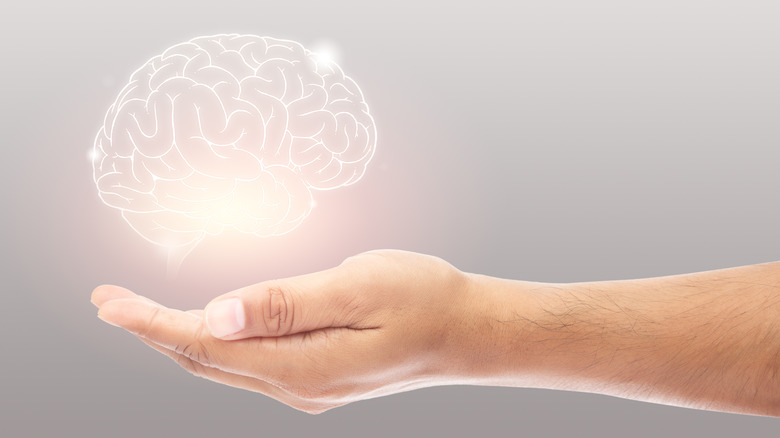Science Says This Is The Age You Actually Become An Adult
Marking the passage of time with birthday parties and milestone celebrations is a simple way to track chronological development. But in reality, the dividing lines between childhood, adolescence, and adulthood are much less clear.
When it comes to legal status, at 16 many find a set of car keys in their hands, and at 18 (the age of legal adulthood in the US) teens can vote, sue someone, run for office, buy certain firearms, join the military, or get married (via Dallas Morning News). At 21, you can legally buy and consume alcohol and tobacco products.
If the ages set for some of these privileges and responsibilities seem arbitrary, it's because, to some extent, they are. How can an 18-year-old be mature enough for the commitment of marriage, but not mature enough to drink a beer? The question of what actually makes someone an adult, and at what age that magical stage is actually attained, is complicated and full of variables. And really, should adulthood be measured by age, or by responsibility?
For years, there has been a basic consensus among scientists that most brains do not fully develop until around age 25, and that, largely because of this, young people tend to use less restraint and discipline than older people (via The New York Times). This understanding has had major legal implications, especially when it comes to criminal justice.
Is being an adult more about responsibility, or age?
Now, more recent research by brain scientists has pushed the date for full brain development back even further, into the 30s (via BBC). Cambridge University Professor Peter Jones says, "What we're really saying is that to have a definition of when you move from childhood to adulthood looks increasingly absurd. It's a much more nuanced transition that takes place over three decades."
The transition to adulthood is one that researchers have had a hard time marking with any sort of scientific accuracy. The age at which people self-report "feeling" like adults varies wildly, and in most cases coincides with taking on a number of major life responsibilities, like getting a mortgage or having children (via BBC).
Laurence Steinberg, professor of psychology at Temple University, says "Chronological age is not a particularly good indicator [of maturity], but it's something we need to do for practical purposes. ... What's really important is that the transition into adult roles is taking longer and longer" (via The Atlantic).
Stages of brain development
We usually think of childhood when we think of human development, and while it's true that the brain changes dramatically in childhood, it continues changing through adolescence and the twenties (via Frontiers for Young Minds). During adolescence, white matter, which is the part of the brain responsible for sending signals that connect other parts of the brain, increases and then stabilizes by the mid-teens. The brain also does a lot of re-organizing during adolescence, so many of the habits we form and the experiences we have in our teen years can greatly impact how our brains are organized later in life. In this way, adolescents actually have a greater ability to shape their brains and how they develop.
As we get older, the prefrontal cortex continues to develop, which is the front part of our brain that deals with higher-level functions like planning, problem solving, making decisions, and suppressing impulses (per BrainFacts.org). However, there may not even be an age when the prefrontal cortex begins operating at peak performance, as the adult brain also continues rewiring and shaping.
Our brains continue to change, even as we age
It may be hard to identify a particular age that adulthood begins because the brain is always able to change and adapt, known as neuroplasticity (via VeryWellMind). This means that the brain is able to reorganize pathways between neurons, create new connections, and even new neurons, at any age. Our experiences, learning, and memories can strengthen certain pathways, leading to changes in the actual structure of the brain. This helps to promote our ability to learn new things, recover from traumatic brain injuries, and strengthen areas where brain function has been lost.
You can improve your brain's neuroplasticity — and stay mentally young! — by putting yourself in environments where lots of learning is possible. Traveling to new places, learning a new language or how to play a new instrument, creating art, and reading are all ways to encourage positive changes in the brain. It's also important to get enough rest, as sleep is crucial for the growth of the parts of the neurons that transmit information to other neurons. It's also been shown that regular physical exercise prevents neuron loss in part of the brain and encourages new neuron formation.
Is adulthood specific to each person?
No two brains develop in the exact same way or at the exact same pace, according to the U.S. Department of Health and Human Services (HHS). There are many different factors that influence how young people's brains develop and how they think. Everyone learns and processes information differently. Some people need entirely different ways information is presented in order to understand a concept. And some people have learning disabilities that can affect cognitive development.
Trauma can also impact the brain and its development (via HHS). Experiences of violence, neglect, and abuse can actually stunt brain growth altogether. Mental health disorders often first appear in adolescence and young adulthood, as a result of cognitive changes. Substance use can also slow and stunt brain development, and the brain is more susceptible to addiction earlier in life. Lastly, many other factors can influence how brains mature, like heredity and the environment, sex hormone levels, nutritional status, surgical intervention, and economic status (per Neuropsychiatric Disease and Treatment).





